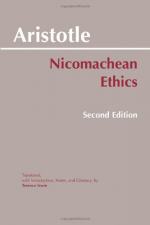
|
| Name: _________________________ | Period: ___________________ |
This test consists of 15 multiple choice questions and 5 short answer questions.
Multiple Choice Questions
1. About what, concerning the virtues, might one raise a problem, as Aristotle states in VI.12?
(a) Their complementary nature.
(b) Their usefulness.
(c) Their veracity.
(d) Their societal fecundity.
2. In exchange for what is it perhaps enough, according to IX.1, to give what one can in return?
(a) Philosophy.
(b) Health.
(c) Mathematical learning.
(d) Knowledge of the gods.
3. In X.1, Aristotle says that people educate the young by what two means?
(a) Philosophy ad rhetoric.
(b) Friendship and love.
(c) Pleasure and pain.
(d) Truth and justice.
4. What sort of person is opposite, in the opinion of Aristotle, the person who is soft?
(a) The enduring person.
(b) The self-restrained person.
(c) The continent person.
(d) The virtuous person.
5. Aristotle states in X.4 that a change of place is what?
(a) A motion from one "where" to another "where."
(b) A circuit from one "where" to the same "where."
(c) An illusion, for there is no change of place.
(d) An illusion, for everything is change.
6. In what status of life is having good friends considered beautiful by Aristotle in IX.11?
(a) Good fortune.
(b) Bad fortune.
(c) Diurnal proceedings.
(d) Unusual circumstances.
7. When do people eat snacks the most in theaters, according to Aristotle in X.5?
(a) When there is no dialogue.
(b) When there is a lot of dialogue.
(c) When the actors are good.
(d) When the actors are bad.
8. What does Aristotle state is akin to friendship in the beginning of IX.5?
(a) Goodwill.
(b) Sound reason.
(c) Love.
(d) Familial relationships.
9. With what virtue does Aristotle credit Eudoxus in X.2?
(a) Courage.
(b) Justice.
(c) Temperance.
(d) Wisdom.
10. What virtue does Aristotle state is concerned with the same things, and is present in the same things, as friendship?
(a) Temperance.
(b) Fortitude.
(c) Justice.
(d) Magnanimity.
11. What is a fitting word for the capacity that Aristotle describes as allowing people to easily achieve one's goal or object?
(a) Cleverness.
(b) Coherence.
(c) Alacrity.
(d) Sincerity.
12. What principally occupies the topic of discussion in X.6?
(a) Work.
(b) Recreation.
(c) Idleness.
(d) Thinking.
13. With what power of the soul does Aristotle state that astuteness shares its concern?
(a) Practical judgment.
(b) Intellect.
(c) Wisdom.
(d) Knowledge.
14. To whom does man look concerning things good and bad, as stated by Aristotle in VII.11?
(a) The philosopher.
(b) The lawyer.
(c) The politician.
(d) The rhetorician.
15. With what state of man's character is VII.5 concerned?
(a) Animality.
(b) Divinity.
(c) Vice.
(d) Incontinence.
Short Answer Questions
1. Deliberation, as Aristotle states in VI.9, is a kind of what?
2. Among what sort of people does Aristotle regard mutual and equal friendships complete in all respects?
3. What does Aristotle, in VIII.5, say causes forgetfulness of friendship?
4. What is the impasse Aristotle confronts in IX.8?
5. In the loving of what does Aristotle state there is no reciprocity, in VIII.2?
|
This section contains 476 words (approx. 2 pages at 300 words per page) |

|




